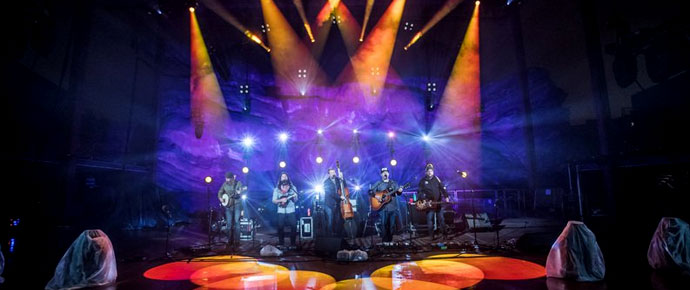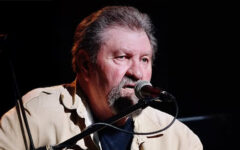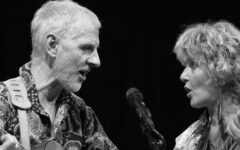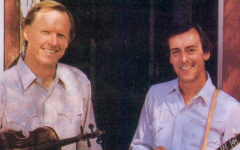
To some, the handle may seem misleading. Indeed, throughout their nearly 19 years of existence, Greensky Bluegrass have relied more on their own invention and less on the historical strains of traditional bluegrass. It’s not that they’ve forsaken it altogether — far from it — but more and more, the music they make is a mesh of sounds best described by a progressive posture, one which falls under the heading of “grassicana.”
The band’s new album, All For Money, furthers significantly Greensky’s ever-evolving trajectory, although several songs — Murder of Crows, Cathedral Eyes, and Wish I Didn’t Know in particular — maintain that bluegrass template in some form or another. Others — What You Need, Courage for the Road, and Ashes — find banjo, guitar, bass, and dobro operating within traditional trappings, while still placing emphasis on style and spontaneity.
Still, the preconceived notion of what a band that has the word “bluegrass” featured so prominently on the marquee, strikes some as curious, even disturbing at times. “There have definitely been some people that have spoken their opinions,” said vocalist and banjo player Michael Bont, speaking on the phone during the group’s stopover in New York City as part of their current tour. “There have been people who have said, ‘You’re not playing the songs right! Play the songs right!’ But that’s been few and far between.”
The band originally hailed from Michigan, a place that Bont still calls home. However the other members of the — Anders Beck (dobro, resophonic guitar), Dave Bruzza (guitar, vocals), Michael Devol (bass, vocals), and Paul Hoffman (mandolin, vocals) — have moved away, mostly to Colorado where the band regularly performs at festivals and other populist gatherings on an ongoing basis.
As a result of that pointed activity, the band is often thought of as a Colorado combo. “A lot of people think that,” Bont remarked. “It’s kind of funny.”
On the other hand, being from Michigan may seem somewhat out of sync with the essential identity of bluegrass. However, Bont is quick to correct that notion, pointing out that Michigan has its own specific ties to the genre.
“The funny thing about Michigan is that Kalamazoo is the original home of Gibson instruments,” Bont points out. “There’s a museum up there that houses all these prewar instruments that are worth 100s of thousands of dollars, and they were all built in Michigan. So there is a solid bluegrass connection there.”
Indeed, But again, who knew?
“It’s a fact which most people don’t know about,” Bont agrees. “But it is one which provides a connection between bluegrass and Michigan that’s historically relevant. As we all know, bluegrass was originally a mix of Irish fiddle tunes and Scottish folk music, but still, that Michigan connection is definitely kind of interesting. It’s funny to hear people say, ‘Really, I didn’t realize that!’”
Ultimately, the new album reflects the essence of what Greensky Bluegrass has been about practically since the beginning, a band that maintains its reverence for their roots as well as a determination to carry that seminal sound forward.
“Our songs always had some boundaries,” Bont maintains. “The last few albums had two or three songs that could stand outside that box, but this is the first album where we said, ‘okay, it doesn’t matter,’ we’re going to record this album and see what happens, instead of just finding one tune that we’re going to make a live tune. It was cool not to have to stick to that.”
While it’s true that the aforementioned traditionalists may object to the liberties they tend to take with the music, ultimately, the musicians that belong to Greensky Bluegrass have to be credited with taking a certain amount of risk. Then again, that’s the chance that’s generally taken when a band opts to bend some boundaries.
Bont acknowledges that some might sense a disconnect, but he also emphasizes that the group has always made it a point to balance those disparate sounds adroitly. Their six previous studio albums — Less Than Supper (2004), Tuesday Letter (2006), Five Interstates (2008), Handguns (2011), If Sorrows Swim (2014), and Shouted, Written Down & Quoted (2016) — and relentless road work prove that point.
“We do have a bluegrass background, but we’e always tried to find our own niche,” he insists. “Many people think of us as a rock band that plays bluegrass. I think that’s real interesting.”







